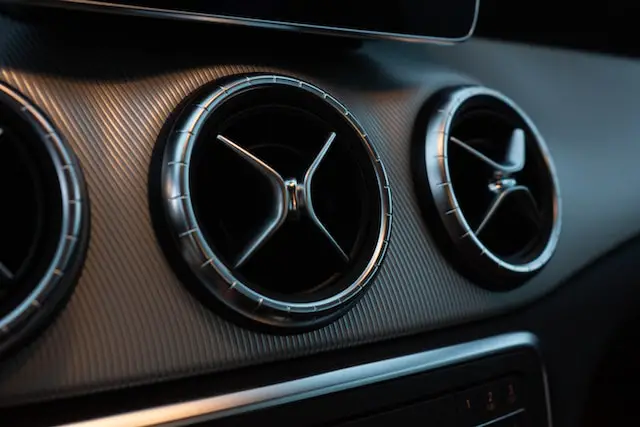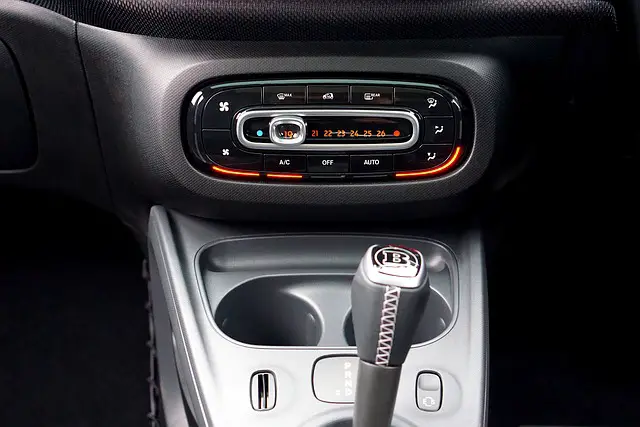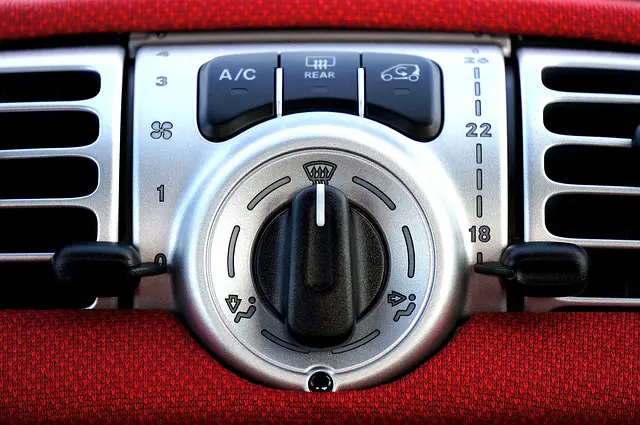Both AC and Max AC serve the same purpose of cooling down your vehicle’s interior. However, Max AC is more powerful and efficient at quickly dropping the temperature in your car. It consumes more fuel than regular AC because it draws more power from the engine.
What is AC?
(Photo by Philipp Katzenberger on Unsplash )

Air conditioning (AC) is a system that is designed to cool, dehumidify and circulate indoor air. It utilizes the principles of thermodynamics and heat transfer to remove heat from an area and provide comfortable living conditions. ACs are commonly found in homes, offices, hospitals, malls, cars and other spaces where temperature control is essential.
The basic components of an AC system include a compressor that pumps refrigerant through a closed system of coils; evaporator which absorbs heat from the air as it passes over its surface; condenser which releases collected heat outside; expansion valve which regulates the flow of refrigerant between the evaporator and condenser.
There are various types of ACs available today such as window units, split systems, portable units, central cooling systems and more. Each type has its benefits depending on your specific needs.
Regular maintenance such as cleaning filters or replacing older parts can improve efficiency while reducing energy costs for running the unit. Overall regular use of air conditioning helps improve indoor air quality by removing excess humidity thereby reducing mold growth and helping with allergies caused by airborne irritants like dust mites or pet dander.
What is Max AC?
(Photo by Philipp Katzenberger on Unsplash )

Max AC, also known as Maximum Air Conditioning, is a feature found in many modern vehicles. It works by increasing the fan speed and cooling power of your car’s air conditioning system to its maximum level. This setting is perfect for those hot summer days when you need an extra burst of cool air to beat the heat.
When you turn on Max AC, your car’s compressor runs continuously at full blast to provide optimal cooling performance. This results in a faster drop in temperature inside your vehicle and provides an instant relief from the scorching heat outside.
Keep in mind that using Max AC can put additional strain on your car’s engine and decrease fuel efficiency slightly. However, it is still more efficient than rolling down all windows while driving at high speeds or having the air conditioner set below maximum cooling capacity.
Max AC is a useful feature for drivers who live in areas with extreme temperatures and want quick relief from the heat during their daily commute or long road trips.
AC Vs. Max AC – Key differences
AC and Max AC are two different settings found in most modern cars. While both are designed to help keep drivers cool and comfortable on hot days, they operate differently.
The main difference between AC and Max AC is the amount of air that flows into the car’s cabin. When you turn on your regular AC, it cools down the existing air inside your car without bringing in fresh air from outside. However, with Max AC, a much greater volume of fresh outside air is brought into the cabin at once before being cooled by your car’s system.
Another key difference is how quickly each setting can bring down the temperature inside a vehicle. With regular AC, it may take longer for the interior to reach a comfortable temperature because there isn’t as much airflow coming through. In contrast, Max AC provides an instant blast of coolness due to its high-speed fan setting.
It’s important to note that using Max AC will require more energy from your engine due to its higher demand for power than standard ac mode. This means you’ll likely burn more fuel when driving with this feature turned on compared to using just regular ac mode alone.
While both settings serve similar purposes – keeping drivers cool – their methods differ greatly which affects performance and fuel efficiency as well as comfort levels within vehicles depending on weather conditions or personal preferences during long drives!
How to Calculate Your AC
Calculating your AC can be a bit tricky, but it’s essential if you want to know how efficient your air conditioning is. The first step is to gather some information about your AC unit. You will need to know the make and model of your system, as well as its BTU (British Thermal Unit) rating.
Once you have this information, you can use an online calculator or do the math yourself. To calculate the AC efficiency in terms of SEER (Seasonal Energy Efficiency Ratio), divide the cooling output over a year by the amount of energy used during that same period.
To determine how much heat energy has been removed from your home or office space, multiply the total number of hours that your system ran by its BTU rating. Then divide this figure by 12,000 to get tonnage capacity.
It’s also important to consider other factors when calculating AC efficiency such as insulation level and building orientation. Keep in mind that regular maintenance and cleaning can help improve efficiency levels too.
By keeping these calculations in mind, you’ll be able to get a better idea of just how effective and efficient your air conditioning system really is!
Tips for Increasing Your AC
There are several ways to increase your AC’s effectiveness and efficiency. One simple trick is to clean or replace the air filters regularly as they can become clogged with dust and debris, which reduces airflow and makes it harder for the unit to cool effectively.
Another tip is to keep windows and doors closed while running the AC. This will help prevent warm air from entering your home, forcing your AC system to work harder than necessary. Additionally, you should consider using curtains or blinds during hot days in order to block out sunlight that could heat up your living space.
You may also want to check the insulation in your home since inadequate insulation can lead to energy loss and reduced cooling performance. Moreover, avoid placing heat-generating appliances near thermostats as this can cause inaccurate temperature readings leading too much usage of energy by the AC.
Regular maintenance by a professional HVAC technician can ensure that all components of your AC system are working optimally together so you get maximum performance when you need it most.
Should I use AC or Max AC?
When it comes to choosing between AC and Max AC, the answer is not straightforward. It depends on various factors such as the weather, your preferences, and fuel efficiency.
If you are driving in mild weather conditions or with fewer passengers, using regular AC would suffice. However, if you live in a hot climate region or have a car full of passengers, then Max AC may be more effective.
Max AC works by recirculating the air inside your car instead of drawing fresh air from outside. It cools down faster but also uses more energy than regular AC which can affect your car’s fuel economy.
Another factor to consider is personal preference. Some people find Max AC too cold while others prefer its quick cooling effect during hot summer months.
Whether you should use regular AC or Max AC depends on many variables such as comfort level and fuel efficiency that differ from person to person and situation to situation.
Does Max AC use more gas?
One of the most common concerns when it comes to using Max AC is whether or not it burns more fuel. The answer is yes, but only slightly. When you turn on your car’s air conditioning system, it uses energy from the engine and that energy translates into burning gas.
When you turn on your car’s Max AC, it will consume more fuel than regular AC because the system works harder to pump colder air inside the cabin. However, this does not mean that using Max AC will significantly affect your gas mileage or cause a noticeable increase in expenses at the pump.
The amount of additional fuel consumption depends largely on how often and how long you use max AC mode while driving. If you’re only turning it on for short periods of time, like during traffic stops or when idling, then there won’t be much of an impact.
Ultimately, if staying cool and comfortable inside your vehicle is important to you during hot summer days, then using Max AC may be worth a small bump in gasoline expenses. However, if saving money at the pump is a top priority for you all year round, sticking with regular AC might be a better option for everyday use.
Advantages and disadvantages of Max AC
Max AC, or maximum air conditioning, is a feature found in some newer cars that allows the driver to blast cold air at its highest setting. Here are some advantages and disadvantages of using Max AC:
Advantages:
- Cools the car down quickly: If you’ve been out in the sun all day, nothing will cool you off faster than turning on your car’s Max AC.
- Removes humidity from the cabin: The high power settings help remove moisture from inside the vehicle, which can be especially useful during humid weather conditions.
- Provides relief for allergy sufferers: Running Max AC with recirculation mode on can reduce pollen counts inside your car.
Disadvantages:
- Higher fuel consumption: Using Max AC requires more energy from your engine which means it uses more gasoline. You may notice a decrease in fuel efficiency when running this feature frequently.
- Can put extra strain on the system: Overuse of max AC can lead to potential wear and tear on components such as compressors, evaporators or fans.
- Causes temperature fluctuations between outside and inside air temperatures when switching back to regular A/C mode.
While there are both benefits and drawbacks to using max A/C mode regularly, it ultimately comes down to personal preference. Some drivers enjoy feeling like they’re sitting in an icebox while others prefer their cooling systems set at lower levels.
Featured Image By – Mikes-Photography from Pixabay








